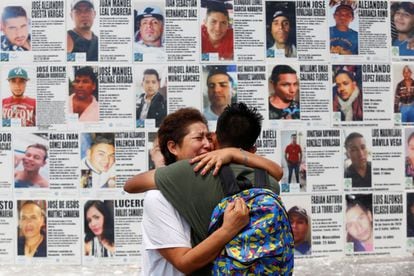A woman hugs her son in front of a mural with information on missing persons, in Guadalajara (Mexico). Francisco Guasco (EFE)
The Committee against Enforced Disappearances of the United Nations has urged Mexico to abandon "immediately" the approach of militarization of public security in the country.
The group of independent experts that visited Mexico in November has indicated this Tuesday that the strategy implemented since the 1990s and still in force has been "insufficient and inadequate" for the protection of human rights.
"The recent regulatory reforms do not escape this trend", indicated the president of the committee, Carmen Rosa Villa Quintana, in a virtual press conference from Geneva (Switzerland).
The report presented highlights that the National Human Rights Commission issued 162 recommendations to the Secretaries of Defense (Sedena) and the Navy for serious violations of human rights;
15 were related to enforced disappearances.
“The permanent participation of the Armed Forces” in public security tasks in Mexico “allows us to question” their respect for “constitutional and international standards in the area of human rights and citizen security,” the report states.
The Sedena and the Navy are among the five federal authorities with the highest number of recommendations pending before the National Human Rights Commission (CNDH), according to the report, and the Sedena and the National Guard are among the ten authorities indicated with greater frequency in the files of alleged human rights violations.
Given this situation, Villa Quintana has pointed out the need to "strengthen the civil forces of order" and to implement an "orderly,
The militarization strategy was promoted especially from the six-year term of the PAN member Felipe Calderón (2006-2012), who brought the Army to the streets to fight the cartels.
The so-called war on drugs has continued ever since.
The modality did not change with the coming to power of Andrés Manuel López Obrador (Morena), who had promised to change it.
In 2019, however, the president created the National Guard as a civilian police institution that in practice is a military body: of its 101,182 members, 58% come from the Army and 16% from the Navy;
only a third belonged to the old Federal Police.
A year later, López Obrador published a presidential agreement that ordered the Armed Forces to remain in security functions.
Disappearances grew exponentially during this period.
More than 98% of those observed in the report happened between 2006 and 2021.
The document states that the data "shows the close relationship between the increase in disappearances" and the strategy implemented in the Calderón government.
When the committee was in Mexico, between November 15 and 26, there were 95,121 people registered as disappeared since 1964. 112 disappearances occurred during the visit of the independent experts, who toured 13 states and met with federal and state authorities, commissions of search, relatives of victims, officials, civil rights organizations, in addition to attending exhumations, tracking days and prisons.
It was the first visit by the agency, which since 2013 had tried to participate in the search processes without the support of governments.
In the last two years, according to the official data they accessed,
"There has been a reduction in the number of missing persons."
“However, the disappearances are frequently reported between one and two years after superpetration,” warns the analysis released this Tuesday.
Forced disappearances continue to be committed directly by public agents at the federal, state and municipal levels.
Organized crime has also become "a central perpetrator" of disappearances, "with various forms of collusion and varying degrees of participation, acquiescence or omission of public servants."
"The States Parties are responsible for the forced disappearances committed by public servants, but they may also be responsible for the disappearances committed by criminal organizations," Villa Quintana commented.
Although the disappeared continue to be mostly men between the ages of 15 and 40, official figures show a “notable” increase in the disappearances of boys and girls from the age of 12, adolescents and women.
Alert for "almost absolute impunity"
Only between 2% and 6% of the disappearances had been prosecuted until November 26, 2021, according to the investigations of the committee of experts, and only 36 sentences had been issued in the entire country.
Added to this, the report points out, is the “often passive” attitude of the judicial institutions, which causes a “lack of confidence” in the victims and results in a “high number” of unreported cases.
"Impunity in Mexico is a structural feature that favors the reproduction and cover-up of forced disappearances and endangers and causes anxiety to the victims," said Villa Quintana.
The committee has considered that the fight against this lack of investigation and convictions is "indeferable".
Added to the disappearances is another problem, which is the forensic crisis.
According to public data, more than 52,000 unidentified deceased persons are found in mass graves, forensic services facilities, universities and forensic custody and storage centers.
"According to several interviewed experts," the document points out, "under current conditions, it would take 120 years to identify them."
The states of Baja California, Mexico City, the State of Mexico, Jalisco, Chihuahua, Tamaulipas and Nuevo León account for almost 72% of the unidentified bodies.
Forensic services, says the report, are "insufficient" and the situation is aggravated because the instruments provided for in the law have not been established.
Recently, the Government has proposed to create a human identification center to deal with the crisis.
Although "multiple projects and public policies have been established to deal with disappearances" over the years, the lack of coordination between the different institutions and actors, the reduced budget with which the search commissions operate, and the lack of personnel prevent curb the phenomenon, according to the report.
For this reason, the committee has urged the Government to “urgently” adopt a national policy to prevent and eradicate disappearances that involves federal, state, and municipal authorities, autonomous bodies, victims, and the groups that represent them. , which combats the causes of forced disappearances and aims at their non-recurrence.
“For disappearance to stop being the paradigm of the perfect crime in Mexico, prevention must be the center of national policy,”
A call to strengthen the Protection Mechanism for journalists
UN experts have considered the disappearance of more than 30 journalists between 2003 and 2021 "worrisome."
The murder of eight reporters in the first three months of the year has led to the attacks against the press in Mexico and the precarious context in which journalists work at the international level, from where different organizations and governments have demanded that López Obrador pay attention and investigate these attacks.
The United Nations committee that visited the country in November has also shown its "concern" about the disappearance of human rights defenders in the territory, for whom "aggressions are a constant reality,"
subscribe here
to the
newsletter
of EL PAÍS México and receive all the informative keys of the current affairs of this country




/cloudfront-eu-central-1.images.arcpublishing.com/prisa/CX5SWS55BJEZRMWAGZJVA52TW4.jpg)


